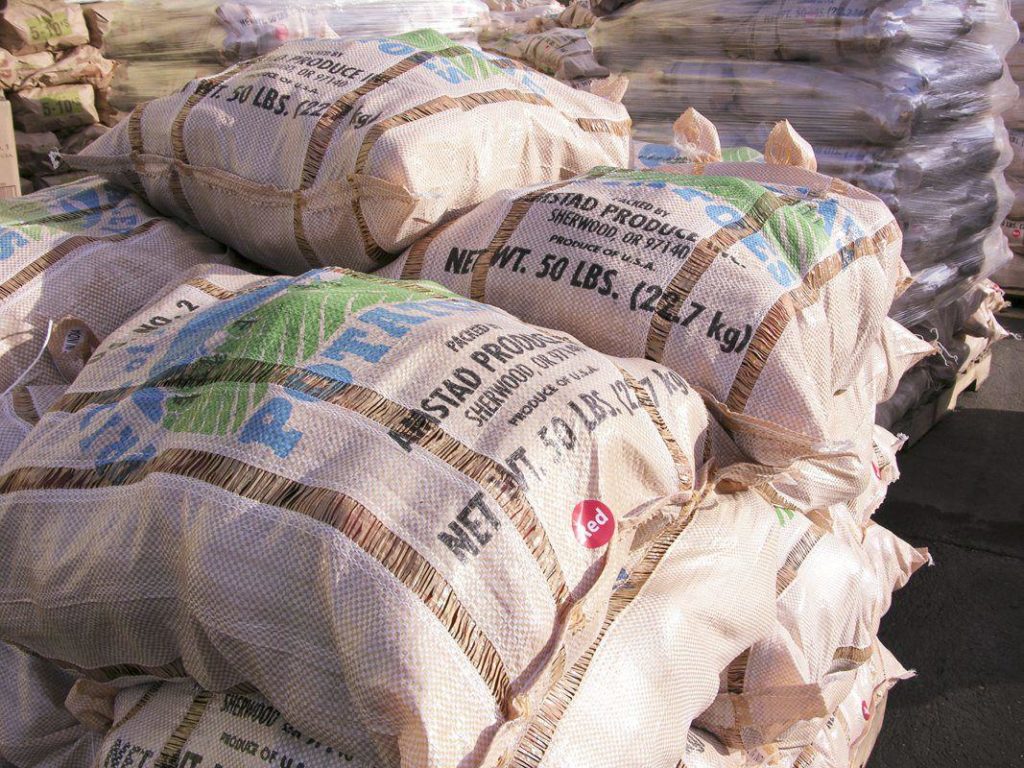By GEORGE PLAVEN Capital Press Mar 25, 2020

Sacks of potatoes destined for local food banks are stacked at Amstad Produce in Sherwood, Ore. With the coronavirus leaving many people out of work, food banks are scrambling to meet the surge in demand. Organizations such as Farmers Ending Hunger are stepping up donations to the Oregon Food Bank and its affiliates across the state.
PORTLAND — With schools and many businesses closed statewide to slow the spread of COVID-19, Oregon farmers are digging a little deeper to feed those in need.
Farmers Ending Hunger, a nonprofit organization that works directly with farmers and ranchers to support the Oregon Food Bank, is pledging to ramp up donations as the coronavirus outbreak has forced companies to lay off thousands of employees, putting families in a tough financial spot.
Founded in 2004, Farmers Ending Hunger received over 3 million pounds of fresh food last year from producers, including potatoes, onions, cherries, hamburger and wheat that is used to make pancake mix. Over 80% of donations come from rural Umatilla and Morrow counties in Eastern Oregon, which are then distributed to local food pantries across the state via the Oregon Food Bank network.
John Burt, executive director of Farmers Ending Hunger, said the group hopes to double the amount of food donated by farmers to keep up with increasing demand for emergency assistance.
“We are going to do everything we can to get more product into the pipeline,” Burt said. “I just can’t help but think there’s going to be increased demand over the next few weeks. … One thing that can help for people who need it is a food box at the end of the month to keep them whole, and put food on the table.”
The Oregon Food Bank typically serves about 860,000 people annually in all 36 Oregon counties, plus Clark County, Wash.
However, CEO Susannah Morgan said requests have increased 20-30% over the past week as states have implemented stay-at-home policies to limit the coronavirus’ spread.
“At this point, it’s being driven by the economic conditions,” Morgan said. “It’s being driven by people losing their jobs or losing hours, with rent coming due in not too long and doing what they can to make sure their family stays housed.”
Morgan said it is not clear how quickly the states’ economies will rebound even after the immediate outbreak has passed, making food donations all the more important for the foreseeable future. She said Oregon is fortunate to have such a robust agricultural sector, and the food bank will continue to rely heavily on donations from farmers.
“We delight in our partnership with Farmers Ending Hunger,” she said. “The Oregon Food Bank network as a whole collectively distributes more than 100 million pounds of food a year. We are all gearing up to needing 20-30% more than that, so we need to find a couple tens of millions more pounds of food. This will definitely help.”
In addition to fresh produce, Farmers Ending Hunger receives 7,000 pounds of hamburger per month from cattle raised at Threemile Canyon Farms in Boardman, Ore., and a portion of the state’s wheat harvest is donated and turned into pancake mix — processed by Grain Craft in Pendleton and Continental Mills in Washington.
Kenzie Hansell, a wheat farmer in Athena and Hermiston, serves as a board member for Farmers Ending Hunger. His father, Tyler Hansell, was one of the first farmers to partner with the organization 16 years ago.
“We, as a family, appreciate being involved,” Hansell said. “It really connects rural and urban (Oregon) together. This is a statewide situation where we can all come together and relieve that stress of food insecurity.”
Despite the pandemic, Burt said farmers are still farming and will continue to rise to the challenge.
“They understand their role, of farmers feeding hungry people,” Burt said.